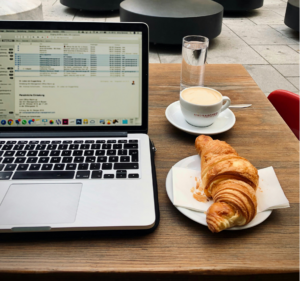1. Morning Rituals to Start Work with the Right Mindset
We’ve all experienced how stressful mornings can be, especially when children are involved and need to be cared for. However, rather than downing your espresso and cramming everything in at the last minute, making time for yourself in the morning should be a priority. Starting the day with high stress levels is the perfect recipe for a stressful workday.

Instead of sleeping in until the last minute and hitting the snooze button for the third time, get up on time and incorporate some morning rituals into your daily routine. If you don’t feel like journaling or doing morning affirmations, at least enjoy your coffee or green tea in peace, prioritize a nutritious breakfast, and get some fresh air in the morning.
2. Organize Your Day Ahead of Time
The more tasks you have to complete, the more important it is to plan your workday ahead of time. This can also boost your overall efficiency. As a result, starting your day with a to-do list has proven to be effective for many. This way, you can check off completed tasks, giving you a sense of accomplishment.
3. Work on Your Relationships with your Co-Workers

Good teamwork can be an important factor in increasing efficiency. Conflicts with team members can have a significant impact on your stress levels at work when you have an overwhelming workload. As a result, it is critical to cultivate positive relationships with your co-workers. Because it will be difficult to avoid colleagues at work, keep disagreements professional rather than escalating.
4. Creation of a Comfortable Work Environment
Physical discomfort can be the source of workplace stress. Office noise, uncomfortable chairs, and bright lights are just a few examples of workplace conditions that can cause frustration and stress. Because you spend so much time at your desk at work, you should prioritize a comfortable environment and thus negotiate in the event of discomfort. It will also benefit your manager to invest in your comfort because reduced stress levels improve overall productivity.
5. Leave Your Workspace When Taking Breaks

If you have a busy schedule, it may be tempting to eat your lunch quickly at your desk rather than taking a proper break. However, it is critical to take some time to breathe and get your mind off work in order to reduce stress and remain productive. At least once during the day, leave your workplace and go outside.
6. Avoid Multi-Tasking
When you have a lot of things to do at the same time, it’s tempting to multi-task. However, it frequently results in a decrease in performance. Prioritize focusing on one task, checking it off your to-do list, taking a short break, and then returning your full attention to the next task.
7. Include Exercise in Your Workday
A short walk at lunchtime or stretches throughout the day can work wonders! Not only has (even minor) exercise been shown to reduce stress, but it also increases overall productivity. It benefits both your physical and mental health, and it also helps you stay in shape!

8. Don’t Forget to be Proud of Small Achievements
Even if you’re feeling overwhelmed by the number of tasks you have to complete, it’s still important to celebrate small victories and be proud of yourself for every task you’ve completed! Don’t fall into the perfectionist trap, where you constantly doubt yourself because you believe you could have done tasks better and faster. It is not beneficial to anyone if you become burnt out as a result of stress you create for yourself. Know your limitations and be proud of your accomplishments!
9. Do Not Make Working Over Hours Your New Normal
It is often expected, especially at the start of a career, that you prove yourself by meeting deadlines on time, even if this means working long hours on a regular basis. However, whether this is effective in the long run is debatable. Nobody can concentrate for 12 hours a day, seven days a week! Understand and communicate your boundaries! Otherwise, tasks may be completed but not always to your usual standards. Delegate it to team members if possible.
What is your experience with workplace stress, and more importantly, what are your most recommended stress-reduction strategies? Let’s talk about it in the comments!
See you soon,
Aline & the Lookeen team



Leave a Reply